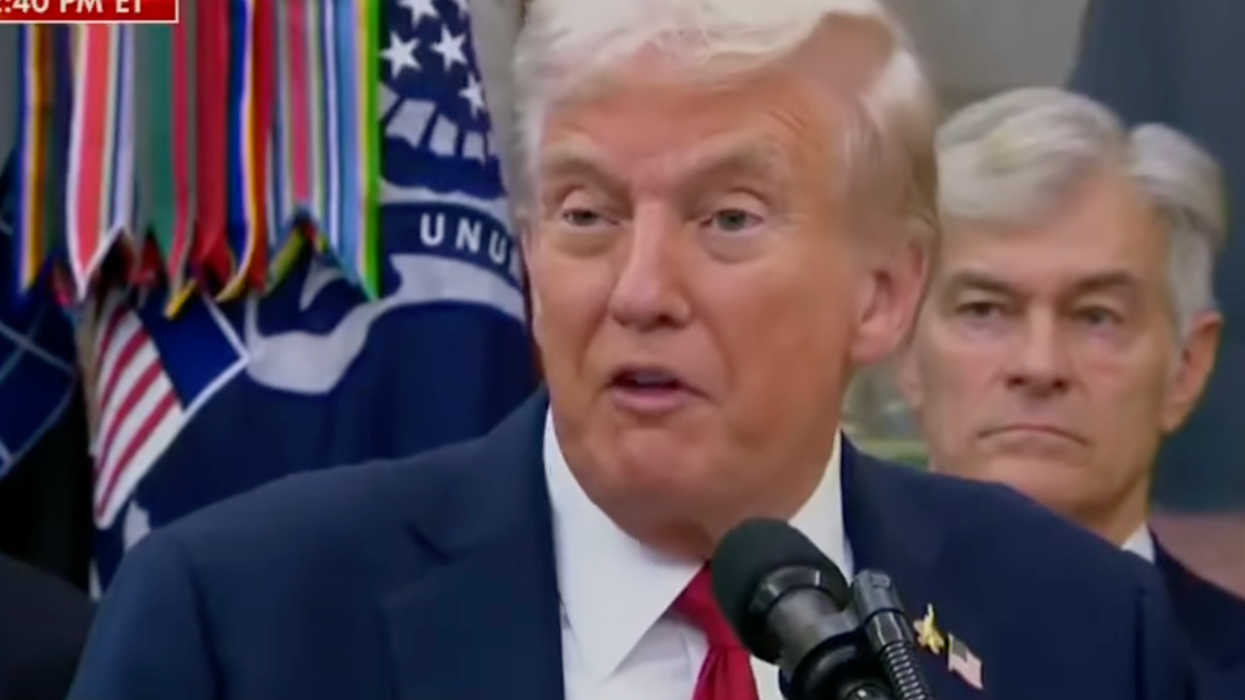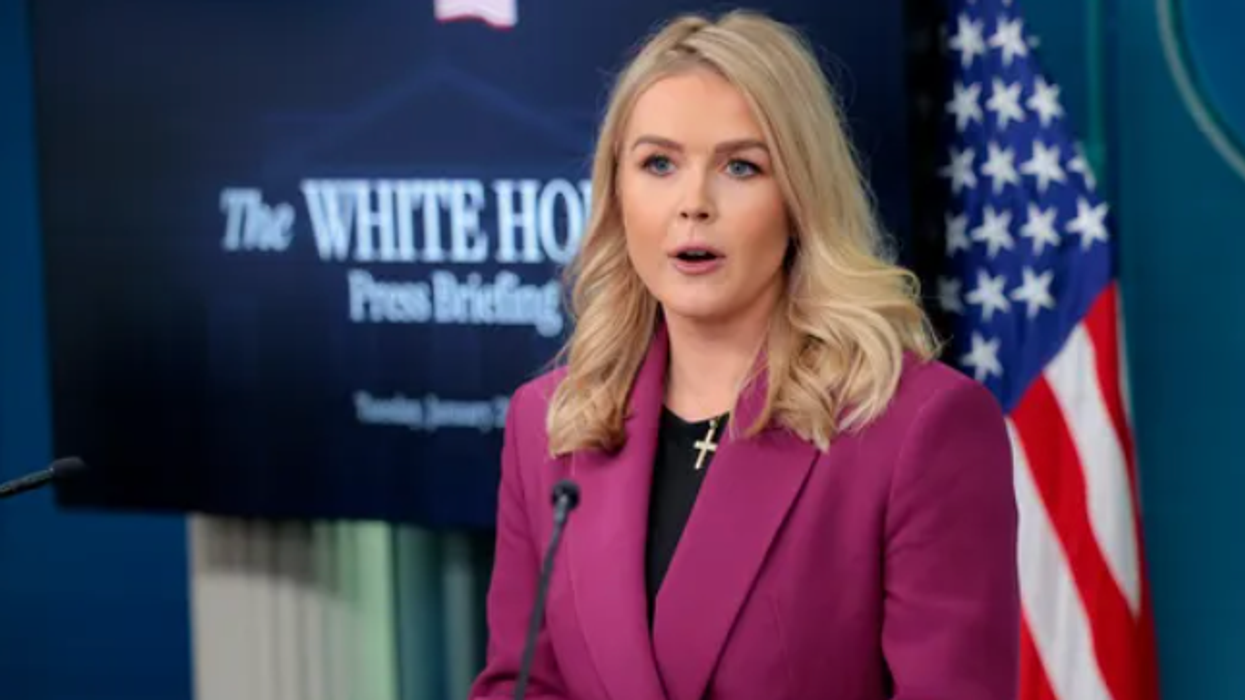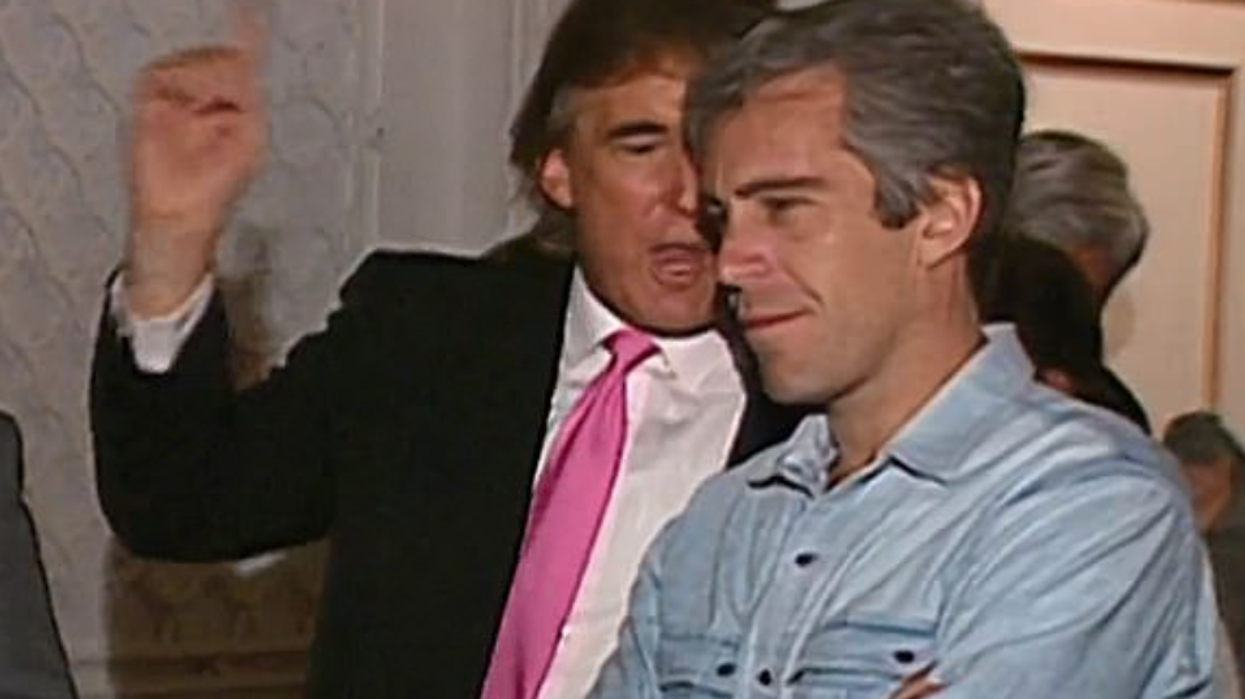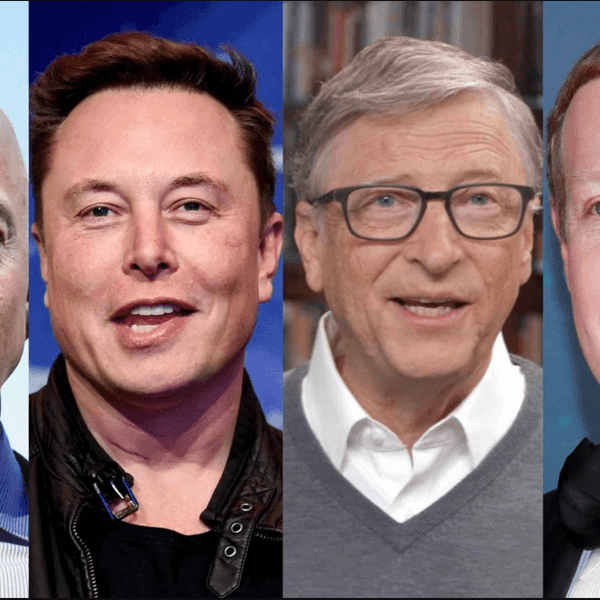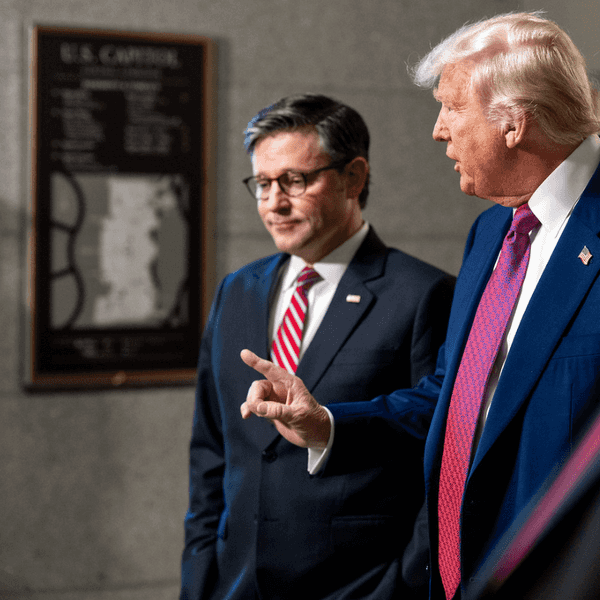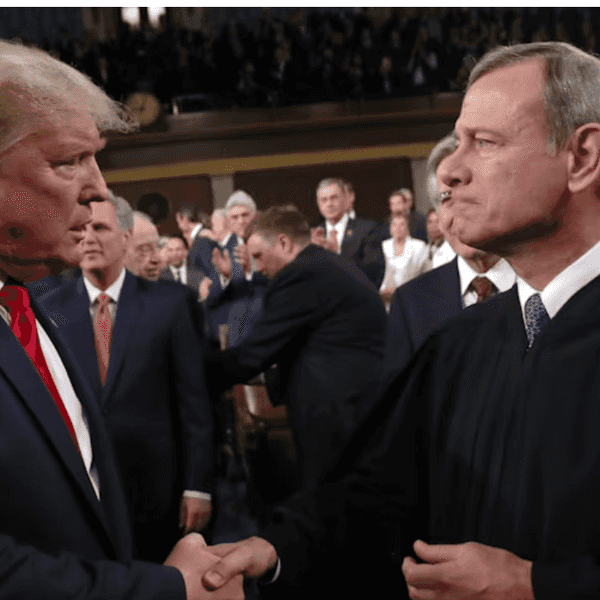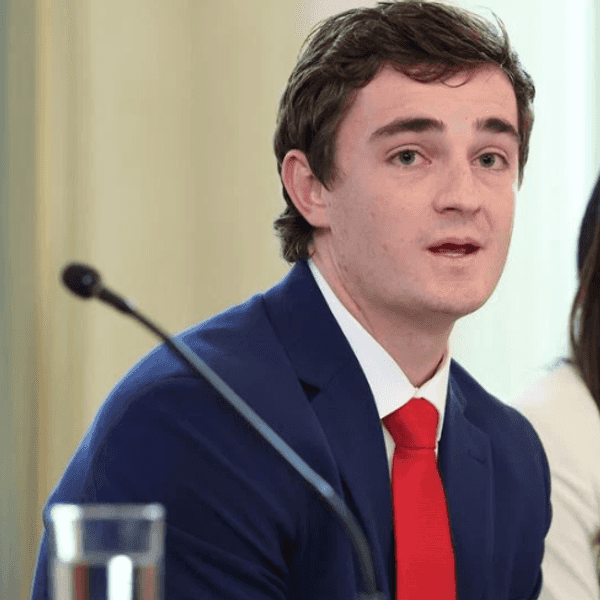The story of the long, tight relationship between Donald Trump and Jeffrey Epstein involves shared accusations from multiple women and frolics at social events, rides on each other's planes, and many salacious blind items in tabloids. The President wants this history to disappear. According to Sen. Dick Durbin, Pam Bondi ordered a thousand FBI agents to scour 100,000 pages of Epstein evidence and “flag” mentions of Trump.
We don’t know – and now may never know – what the agents flagged. But those dusty old public records barely scratch the surface. Back in the day, the British tabs* were also catching glimpses of Trump while tracking Prince Andrew’s escapades with Epstein.
Because Trump and Epstein were tight. How tight? More than half of all the photos of Epstein in the Getty Archive between 1987 and 2004 seem to be with Trump or at Mar-a-Lago. People thought they were best friends. They are linked by women, or groups of women, some of whom have accused Trump and Epstein of sexual abuse.
In April 2000, for example, the Mail on Sunday quoted a neighbor of Epstein’s: “I often see Donald Trump and there are loads of models coming and going, mostly at night.”
In late 1997, according to one report in the Daily Mirror, Trump dated and even housed a young woman introduced to him by Ghislaine Maxwell, who later went on to tell NBC that she’d been raped by and trafficked by Epstein for several years prior. Around the same time, Prince Andrew and Ghislaine Maxwell flew on Trump’s plane from London to Florida, where Randy Andy was consorting with a Boca Raton “sexologist” and spotted at what the Mirror called “a club frequented by gays.”
Now Bondi is racing down to a Florida prison to meet personally with Epstein’s convicted procuress. The U.S. House is adjourning early to avoid further discussion of the Trump-Epstein connection. The President of the United States is calling people who believed him when he said he would reveal all of the Epstein story “fools.”
To borrow a phrase from one of the great Republican Masters of Disaster, there are many Unknown Unknowns in the Trump-Epstein story. This week’s Freakshow is a compilation of the Known Knowns of the 20-year friendship between Donald and Jeffrey.
1987
Trump and Epstein strike up a friendship around 1987, based on Trump’s own reckoning, having said in 2003, “I’ve known Jeff for 15 years.” Jack O’Donnell, president of Trump’s Atlantic City Trump Plaza Hotel from 1987-91, has said he saw Trump and Epstein together so “frequently” he told The Independent that he thought Epstein was Trump’s “best friend.” O’Donnell also described an incident where Trump brought Epstein and a 19-year-old girl to the casino gaming floor.
May 17, 1989
Trump shows up on Robert Maxwell’s yacht, the Lady Ghislaine, at a party in New York harbor. Ghislaine Maxwell is among the guests. Epstein is not listed in the society column about the event, but by 1989, he had become close with Robert Maxwell in London, where investigative journalists have claimed he helped the media mogul and sometime spy hide money he was pilfering from his company..
1990s
Throughout the ‘90s, Trump was a master modelizer. He hosted contests and parties in private suites at the Plaza, which he owned at the time, at which “young women and girls were introduced to older, richer men,” per a fashion photographer source, who said the girls were as young as 15. The girls were lured to New York for competitions and pageants, some of which Trump sponsored and judged. It’s not known whether Epstein was present at these events. But per testimony at Maxwell’s trial, at some point in that period, Epstein took a pseudonymous “Jane” to meet Trump at Mar-a-Lago when she was 14 years old.
December 1992
Epstein introduces Sports Illustrated model Stacey Williams to Trump at a Christmas party. “It became very clear then that he and Donald were really, really good friends and spent a lot of time together,” Williams has since said. Three months later, Epstein took Williams to Trump Tower, where she says Trump groped her while laughing with Epstein, an activity she has said she thought was “a twisted game” between the men.
January 1993
Between 1993 and 1997, Trump flew on Epstein’s plane eight times, according to flight logs, usually between New York and Palm Beach, and sometimes with his family members
On January 23, 1993, Trump and Epstein were the only guests at a “Calendar girls competition” at Mar-a-Lago arranged by pageant promoter George Houraney. Houraney’s then-girlfriend and business partner, Jill Harth, says Trump assaulted her that evening, forcibly kissing and fondling her in Ivanka’s bedroom and even restraining her from leaving as she protested. Harth has also said Trump later crawled into the bed of a 22-year-old contestant uninvited.
December 1993
Epstein attended Trump’s wedding to Marla Maples and is seen there clad in white pants and a bow tie, in photos recently uncovered by CNN.
1994
At some point between June and September 1994, a pseudonymous woman calling herself
“Katie Johnson” in court documents has alleged that Trump and Epstein repeatedly abused and raped her over the course of four months when she was 13 years old. Trump has denied this. In 2016, before the election, Johnson was for a time represented by lawyer Lisa Bloom, who arranged an interview with Johnson, which Johnson cancelled at the last minute after her car was vandalized. Bloom has said that she found “Johnson” credible, but her whereabouts today are unknown.
1995
Epstein and Maxwell were photographed at Mar-a-Lago with Epstein's assistant Gwendolyn Beck. (The precise date of the image is not known.)
Also in 1995, Epstein accuser Maria Farmer, at the time a young New York artist whose work Epstein was supporting, says Epstein summoned her to his offices late at night, where Donald Trump soon arrived. According to her account in the New York Times: “Ms. Farmer said she recalled feeling scared as Mr. Trump stared at her bare legs. Then Mr. Epstein entered the room, and she recalled him saying to Mr. Trump: “No, no. She’s not here for you.”
The two men left the room, and Ms. Farmer said she could hear Mr. Trump commenting that he thought Ms. Farmer was 16 years old.”
According to Michael Wolff, who has released some of his five years of interviews with Epstein, Trump and Epstein competed to date the hottest models, and sometimes shared or traded girls between them, engaging in what Wolff described as a kind of rich man’s cruel sport.
January 5, 1997
Trump flew on Epstein’s plane from Palm Beach to Newark with Epstein, Ghislaine Maxwell, brother Mark Epstein, the Glenn Dubin family, and Epstein’s chef. (Dubin and the chef would later be identified in the depositions of victims and others as witnesses to trafficking). A month and a half later, Trump and Epstein were photographed together at the Pro Am tennis Tournament at Mar-a-Lago.
April 8-9, 1997
Trump and Epstein were photographed together at a Victoria’s Secret Angels event at Club Duvet on 21st Street in NYC. The photo is unposed, and Epstein’s signature smirk is visible right beside Trump’s profile.
April 29, 1997
Ghislaine Maxwell attends a “Gucci Envy” party to celebrate the design house’s new perfume, hosted by Trump at his Trump Tower penthouse. Maxwell is in attendance, and the party-goers include what appear to be several very young, quite possibly underage models.
November 23, 1997
The Daily Mirror reported Trump was dating a 20-year-old British model, Anouska De Georgiou, who Ghislaine Maxwell had introduced to him at a party in New York. In 2019, De Georgiou accused Epstein of raping her at age 19, in a NBC Dateline episode.. According to the Mirror, “after their meeting, Trump flew Madam Maxwell and the model south to the sunshine state, where they enjoyed a happy weekend together. When they returned to New York, Anouska was installed in one of Donald’s many apartments there.”
October 1998
According to a report in the Miami Herald, Epstein associate Jean Luc Brunel’s model agency sent a busload of paid models, some underage, to a Mar-a-Lago party, at which former model Zoe Brock says she was given a spiked drink.
1999
In a video unearthed by CNN, Trump and Epstein are together, laughing and talking, at a Victoria’s Secret party (Victoria’s Secret was owned by Epstein’s main benefactor, Les Wexner).
April 1999
Epstein and Maxwell invite Trump to a party with Prince Andrew, according to Craig Unger in his book, American Kompromat.
Early 2000s
In his book, Unger details the ways that Trump, Epstein, and Epstein’s sometime associate in the trafficking world, Jean Luc Brunel, relied on each other as they each set up model “agencies” that served as trafficking nodes.
In 1995, Jean-Luc Brunel moved to the US and founded MC2 Model Management, with financing from Epstein; the younger models were allegedly part of Epstein’s trafficking operation. “In addition to whatever legitimate careers Brunel may have fostered, as a ‘model scout’ he also allegedly hired ‘scouters’ to identify, procure, and transport underage girls, many fifteen years of age and under, hire them to give ‘massages,’ and train them to give sexual pleasure,” Unger wrote.
Unger quotes a sworn deposition from 2010 by MC2 bookkeeper Maritza Vasquez, who claims directives about contracts for these “scouts” came “from the office of Jeffrey Epstein.”
February 12, 2000
Trump, Melania, Epstein, and Maxwell are photographed together at Mar-a-Lago during an evening reception for the Pro-Am tennis tournament. Prince Andrew and Epstein associate Gwendolyn Beck were also at the event. Two days later, Trump announces that he is withdrawing from the presidential race in an interview with Matt Lauer on the Today show.
Late summer 2000
Ghislaine Maxwell recruits locker room attendant Virginia Giuffre at the Mar-a-Lago spa.
September 18, 2000
Trump, Melania, and Ghislaine Maxwell are photographed together in the front row at the Anand Jon fashion show in New York. Maxwell and Trump are photographed sitting together front row.
October 2000
Trump is photographed at Heidi Klum’s “Hookers and Pimps” Halloween party with his arm around Ghislaine Maxwell’s waist.
December 2000
Melania appears in British men’s magazine FHM. The photo spread includes a poem titled “Melania’s lingerie poem” that, in syntax and language, is similar to the “bawdy” Epstein birthday message that Trump currently says is part of the “Jeffrey Epstein Hoax.”.
January 2003
Trump’s “secret” card is included in Maxwell’s bound book for Epstein’s 50th birthday.
March 2003
Vicky Ward’s Vanity Fair profile of Epstein mentions Trump as among the “businessmen who dine with [Epstein] in his home.”
April 2003
A New York magazine piece on New York dinner parties names Trump as among the guests at Epstein’s East Side townhouse, along with Ghislaine Maxwell and Les Wexner.
2006
Trump says on Howard Stern's radaio show that the sexual age limit should be above 12.
October 2007
Epstein’s membership account is closed at Mar-a-Lago, per club records; Trump has denied that Epstein ever was a member, but author James Patterson says he spoke to the woman who ran the spa, who said Epstein used to come in and behave inappropriately with girls there.
NIna Burleigh is a journalist, author, documentary producer, and adjunct professor at New York University's Arthur L. Carter Journalism Institute. She has written eight books including her recently published novel, Zero Visibility Possible.
Reprinted with permission from American Freakshow.

